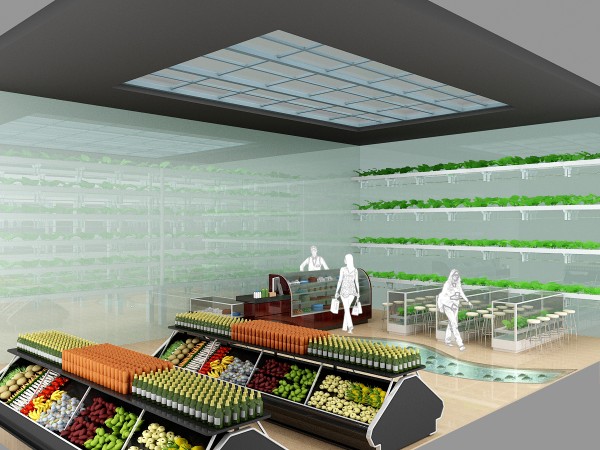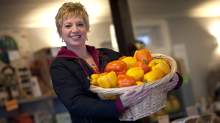I recently came across a new concept in food production masquerading as a local food solution. The way I see it, it’s just industrialized food from the corner manufacturing plant vs. the one thousands of miles away.
Okay, technically that does make it “local”. Scratch the surface, however, and there’s lot more to the notion of eating local than simple geography.
Here’s a summary of the Agropolis idea:
- Employ robots and technology to grow food
- Utilize GMO’s to improve production
- Use artificial — but, hey, low energy consumption — lighting
- Create a “powerful consumer experience” that’s more funky and far sexier than anything you can find that incorporates, say, dirt
I have so many issues with an engineered version of “urban farming” it’s hard to know where to begin. Okay, not that hard. Let’s start with the list above:
- Robots and technology — Sure, who wants people touching your food
- GMO’s — Absolutely. Hellooo, we can’t have Nature running the show
- Artificial lighting — Brilliant, now there’s no need to rely on the nasty, carcenogenic sun
- Farm “experience” vs. actual farm — Great, it’ll be just like the Disney California theme park; super clean and once you’ve been, you’ll never need to visit the state
The whole premise gets off to a rocky start with the stats Agropolis tosses about to portray food as an enemy of the earth, prefaced by “Food subjugates the earth.”
Whoa, Nellie. Food subjugates the earth? No, more like messing with natural food systems messes with the earth. More like, taking plant-based food that would feed 10 people and feeding it to one cow so a handful of folks can eat steak, that messes with the earth.
The local manufacture of food, while accurate on the geographic technicality, in no way constitutes a farm and misses the locavore boat.
Genuine Food
A big part of eating local is about eating food. Real food. Not a reasonable facsimile thereof, even if it was just picked this morning. I mean food that has soaked up the nutrients it needs and gives us the nutrients we need and then gives nutrients back to the earth when we’re done, in a beautiful, self-sustaining cycle. Just as it has for millennia, well, right up until we started messing with it post-WWII.
Science actually knows relatively little about the complexities of how real food works it’s wonderful magic, but we can see the effects when we behave as if we can manage it better than it can manage itself. Let’s face it, food’s got a huge head start on the evolutionary sustainability track.
Food Security
Another huge part of the “eat local” trend is focused on food security. Unlike the image that phrase initially conjures up, food security is not about locking down food so production is in the hands of a tech-savvy few. It’s quite the opposite. It means opening up the guide book, learning how we can each produce our own food, and creating systems to ensure everyone has secure access to quality food, no matter their income or location.
Forget the pleasure and satisfaction that’s derived from growing your own food, and let’s just look at the value of being able to eat quality food, when you’re hungry, even on a pauper’s budget. Stop. Ponder.
Respecting the Earth
In addition to a desire for improved taste and nutritional quality, embedded within eating local is a recognition that what we’ve been doing to the planet with industrial food production isn’t actually working, and it’s time to clean up our act. That includes growing practices, water conservation, multitude forms of pollution (including pesticides, cattle feedlot waste…), carbon footprint, and a great many other activities not related directly to food at all.
Does re-engineering food’s fabrication help solve the problems re-engineering created in the first place, or just create different ones?
Eat + Local
Eating local is just what it says…and more than the sum of it’s parts. It ripples into every segment of our lives. Food is our lives. We must recognize that humans are part of a system, not the creators of it. And let’s face it, we haven’t exactly earned a bonus for our management skills.
When our food got off track, a great many other things jumped the tracks as well. I’m thinking it might be a good idea to go back to where things started going sideways and begin repairing the damage. Maybe by first figuring out how to fit ourselves back into the greater ecosystem, instead of trying to subjugate the system to humankind.

Agropolis Concept Store
Related Post:
Technically Local, But…
 Hey readers, LocalDelicious.com was mentioned in the Globe and Mail today! Way of the Locavore: Four Ways to Escape Global Food by Wency Leung offers ideas on how to go about local sourcing your food.
Hey readers, LocalDelicious.com was mentioned in the Globe and Mail today! Way of the Locavore: Four Ways to Escape Global Food by Wency Leung offers ideas on how to go about local sourcing your food.
